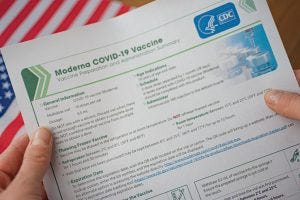Content Spotlight
Podcast: MilliporeSigma says education vital to creating unbreakable chain for sustainability
MilliporeSigma discusses the importance of people, education, and the benefits of embracing discomfort to bolster sustainability efforts.

Moderna aims to up capacity for its COVID-19 vaccine to 1.4 billion doses through investment in ‘flexible’ manufacturing, which it says will offset any risk from variants or future overcapacity.
What a year it has been for Moderna Therapeutics. For the fourth quarter 2020, the firm reported sales of $200 million – up from nothing the previous year – as regulatory approvals began rolling in for its messenger RNA (mRNA) COVID-19 vaccine mRNA-1273.
Since it began working on a COVID-19 vaccine just over a year ago, the firm has set its sights on ensuring global supply through its own site in Norwood, Massachusetts – offering plasmid, buffer prep, QC and sterile filling capacity – and contract development and manufacturing organizations (CDMOs), most prominently Lonza.

Image: iStock/Evgenia Parajanian
And with a high-end target to manufacture 1 billion doses of mRNA-1273 at the 100-microgram dose level this year, the firm expects product sales in 2021 to reach $18.4 billion due already-signed global Advance Pricing Agreement (APA) orders in the books,
But this week the firm laid out plans to further scale-up production going forward.
“We currently plan capital investment in the amount of $350 million to $400 million for 2021,” CFO David Meline told investors Thursday. “Roughly half of the investment is to further expand our COVID-19 vaccine supply capability, including supply capacity up to 1.4 billion doses at the 100-microgram level, with the balance of planned capital investments to expand our technical development, clinical manufacturing as well as our other facility footprint.”
The ramping up of production brought two concerns from investors on the line, both of which were dismissed by CEO Stephane Bancel due to what he described as Moderna’s flexible approach to manufacturing.
The first was the emergence of several variants, which could either reduce the efficacy of the current vaccine or – more likely, according to Bancel – require variant-specific booster vaccines in the future. Moderna has several approaches to combat potential mutations, including planning to test a variant-specific booster candidate, mRNA-1273.351, based on the so-called South African variant.
“The only raw material that is different from mRNA-1273 to mRNA-1273.351 is the plasmid. The enzymes are the same, the lipid is the same, with the same equipment in the same rooms with the same people,” he said.
“Because we use disposable reactors and not stainless-steel reactors, you don’t have to spend a lot of time doing cleaning, validation because we basically dispose of things. And so the flexibility is quite incredible.”
Secondly, investors asked whether the CAPEX placed Moderna at risk of having too much capacity once the pandemic subsides.
While Bancel repeated these expansions will serve Moderna’s mRNA pipeline beyond COVID-19 – the company’s cytomegalovirus vaccine is poised to enter Phase III trials this year – he added again the flexibility of the investment should leave the firm in good stead, and the firm could scale back at its CDMOs if needed.
“In terms of taking down the manufacturing capacity if we don’t need, let’s say in [2023 or 2024], the same amount of volume because of a mass of boosting, it’s actually interesting because, as you know, we have now good plants where we have quite a lot of capacity. But also, we have some capacity at Lonza, in New Hampshire and also capacity in Switzerland, where they have several lines of manufacturing. So we have actually quite a lot of flexibility to take capacity down at Lonza, either in the US and/or in Europe at different time points.”
You May Also Like